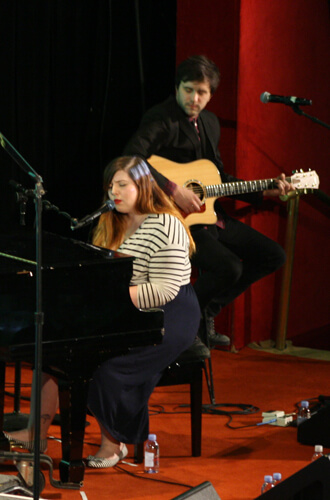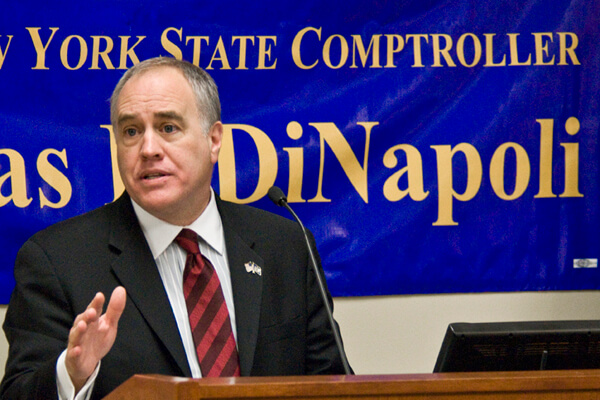Interior Secretary Sally Jewell, with Tim Gill (l.) and City Councilman Corey Johnson, at the May 30 event at the Stonewall Inn. | DONNA ACETO
While the windows at America’s marriage bureaus have been snapping open to gay people of late, the closet doors at the nation’s historic sites often remain shut to their LGBT significance –– and the places key to our history are rarely acknowledged by our government, even here in New York City.
That may change under an initiative announced May 30 by US Secretary of the Interior Sally Jewell in front of the Stonewall Inn, as an audience of gay elected officials and leaders of LGBT organizations looked on. With all the Park Service folks in their ranger outfits on hand, there haven’t been so many uniformed personnel inside and around the Stonewall since the cops at the Rebellion in 1969.
Jewell spoke of “our journey as a country,” how Stonewall “is an important chapter,” and how “part of the job of the Park Service is to tell this story” about LGBT communities across the country. The immediate next step will be a June 10 meeting of 18 scholars in Washington to discuss expanded recognition of LGBT-significant historical sites.
Federal government announces “theme study” to integrate gay stories into existing sites and identify neglected venues
Mike Litterst, a Park Service spokesman, later said the meeting will be “a one-time gathering of researchers and preservationists who will help the National Park Service assess its plans and give recommendations as the study moves forward. It is not a standing committee that will see the study through from start to finish.” Writing on the White House blog, Jon B. Jarvis, the Park Service director, wrote, “There will be a public component of this meeting, too, allowing interested members of the public to hear about the initiative and share their thoughts about it.”
Jarvis’ post, saying the scholars’ meeting would be their “first,” suggested they might meet more than once. As of the time this story went online, the Park Service had not clarified the discrepancy between the director’s blog entry and Litterst’s comment about it being a “one-time gathering,” nor had it provided specifics about the June 10 event and public access to it.
The Stonewall has been a National Historic Landmark since 2000, but the new Park Service “theme study” will identify other “LGBT-associated” historic sites and “encourage[e] national parks, national heritage areas, and other affiliated areas to interpret LGBT stories associated with them.” Similar “theme studies” are underway for other communities, including Latinos, Asians and Pacific Islanders, and women.
The initiative, if tackled thoroughly and with seriousness here in New York, could incorporate information about the homosexual lives of Alexander Hamilton at his Harlem home, the Hamilton Grange, and of Eleanor Roosevelt at her Val-Kill Cottage in Hyde Park –– both existing National Park Service sites.
City Councilman Corey Johnson, in introducing Jewell, suggested the first home of Gay Men’s Health Crisis in a Chelsea townhouse and the site of the Gay Activists Alliance’s old Firehouse headquarters at 99 Wooster Street in Soho as places for the Park Service study to consider.
Jewell emphasized the fiscal constraints on the Park Service effort.
“Due to tight budgets, it is difficult to do what we want to do without private sector support,” she said. “We could not do this without Tim Gill,” who is making a $250,000 to the National Park Foundation for the study. Gill, the Colorado multi-millionaire founder of the software company Quark, pursues gay political activism through his Gill Action Fund and philanthropy through the Gill Foundation.
“Courage in our movement doesn’t come from politicians,” he said. “It comes from people.” History, Gill added, is not made by “big figures, but each and every one of you and anyone who participates. There should be a plaque where Sara came out to her dad,” referring to no young lesbian in particular but to all those who have joined the fray.
Joshua Laird, commissioner of National Parks of New York Harbor, with Tim Gill behind him. | DONNA ACETO
Joshua Laird, commissioner of the National Parks of New York Harbor, called the fight for “LBGT civil rights and equality so fundamental to this country’s history throughout time,” and emphasized that the scholars working on this study “span a broad range of interests.” He promised “an open, public process.”
However, details on public input into the LGBT history study, due to be completed in 2016, have not yet been spelled out.
Among those appointed to the “LGBTQ Scholars Roundtable” guiding this study are Katie Batza, professor of Women, Gender and Sexuality Studies at the University of Kansas who “co-founded the first LGBTQ youth organization in the South,” according to the department’s release, as well as scholars from Stanford, Yale, San Francisco State, Florida State, and the Universities of Maryland, Massachusetts, and Georgia. The group also includes gay historian John D’Emilio, who just retired from the University of Illinois at Chicago, Gerard Koskovich, a co-founder of the GLBT Historical Society in San Francisco, and lesbian novelist Paula Martinac, who wrote the nonfiction “The Queerest Places: A National Guide to Gay and Lesbian Historic Sites.”
Jonathan Ned Katz, founder and co-director of OutHistory.org and author of “Gay American History” in 1976, was not named to the panel, but was on hand for the May 30 event. “Considering the names I recognize, it seems a distinguished group,” he said. “Certainly, the participation of John D’Emilio will make any group live up to its best. Of course, there should be lots of opportunity for public input and the greatest transparency in anything our government does, and the accountability of specific officials.”
When asked about how private money might influence the project, Jewell said that when these contributors “engage, it gives us a sense of ownership in the accurate telling of the story. I don’t think it is at all bad.”
David Carter, author of a definitive history of the Stonewall Rebellion, is also not a part of the study group, but appeared at the announcement.
“I’ve long been saying that our history has to be integrated into the overriding arc of US history,” he said. The study, Carter added, “is a very important step toward making that aspiration a reality.”
Despite the venue chosen to announce the history effort, no veterans of the 1969 Rebellion were on hand.
A banner held up by activists from Get Equal and Queer Nation NY calling attention to their critique of the pending Employment Non-Discrimination Act. | DONNA ACETO
Activists at Ceremony Call for Halt to ENDA Push In a fairly tame nod to the spirit of Stonewall, Get Equal and Queer Nation NY set up an informational picket across the street from the National Park Service event to offer a critique of the long stalled federal Employment Non-Discrimination Act (ENDA). The measure, the groups charged, has an overbroad religious exemption, which actually invites discrimination, and is “piecemeal, stopgap legislation” that focuses only on employment, but not other areas such as housing and public accommodations.
Get Equal and Queer Nation are demanding that advocates on Capitol Hill –– led by the Human Rights Campaign –– instead press for amending the Civil Rights Act of 1964 to provide comprehensive protections based on sexual orientation and gender identity and expression.
The two groups made no effort to disrupt the ceremony with chanting, and the first thing Tim Gill did in making his remarks was to acknowledge the activists’ banner that read “Don’t Stop at Our History. Full Federal Equality Now.”
“We are trying to spread the word that we need federal civil rights legislation that is comprehensive, which ENDA is not,” said Queer Nation’s Ken Kidd, who termed the current bill “dangerously flawed.” He said that the “received wisdom” on ENDA — that it is all that can be achieved in Washington and is worth the concessions on religious exemption language — is “breaking down.”
Despite having praised the activists’ banner, Gill, in comments after the Park Service event, endorsed the current ENDA push.
“The bill is better than nothing,” he said, while acknowledging that discrimination in areas other than employment continues. “That has to stop,” Gill said.
Other movement leaders have been more critical of ENDA.
Evan Wolfson, who heads up Freedom to Marry and was on hand for the Park Service announcement, has joined with attorneys from Lambda Legal, the American Civil Liberties Union, and other groups in zeroing in on critical flaws –– most glaringly, the religious exemption issue –– in the version of ENDA passed last year in the Senate but now stalled in the Republican House.
Matt Foreman, a former leader of the National Gay and Lesbian Task Force who now works on philanthropic grant-giving at the Evelyn & Walter Haas, Jr. Fund, has called ENDA “a lifeless corpse” that should be discarded.
The full description of the Park Service LGBT history initiative is at nps.gov/heritageinitiatives/LGBThistory.



































